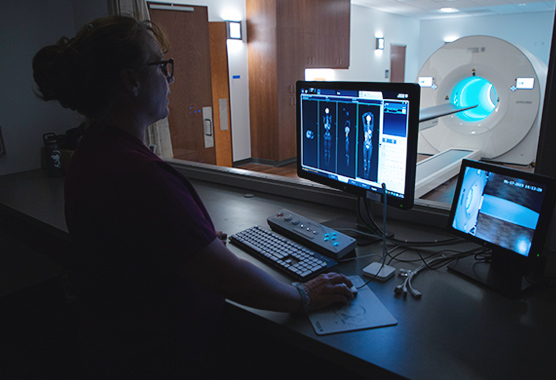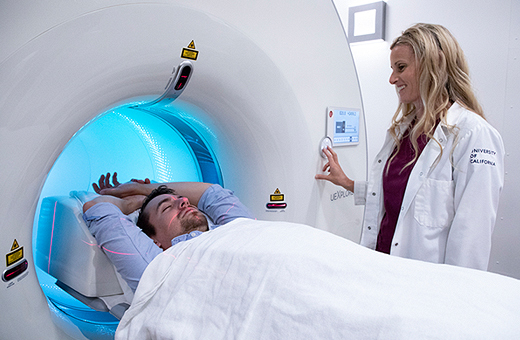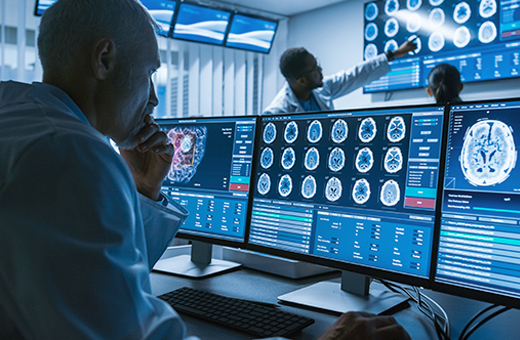Neuroradiology
Highly skilled neuroradiologists perform standard and advanced imaging of your brain and spinal cord. Our services help you receive precise care tailored to your needs.
Medically reviewed by Elizabeth Morris, M.D. on Aug. 30, 2023.

National Leaders in Neuroradiology
At UC Davis Health, exceptional care for brain, neck and spine issues often starts with neuroimaging studies. Neuroradiologists with our Department of Radiology completed the highest level of training and perform more than 45,000 tests per year. This depth of expertise enables us to quickly pinpoint areas of concern and relay critical details to your care team.
Our experts are leaders in their field. We are training rising neuroradiologists through an accredited fellowship program. We also lead scientific studies and clinical investigations through our Imaging Research Center and participate in national research groups.
Types of Neck, Spine and Brain Imaging
UC Davis Health offers neuroradiology services that keep your care moving forward. We use a variety of techniques to get detailed views of central nervous system structures.
X-Ray
This test uses radiation beams to capture images of your spine bones (vertebrae). X-rays typically focus on one area of the spine, like the lower back, upper back or neck.
CT Scan
A CT (computed tomography) scan uses X-rays to show cross sections of your body. We sometimes use a special dye (contrast) to make certain areas more visible.
Brain MRI
MRI (magnetic resonance imaging) uses a strong magnet, radio waves and special software to create 3D images of brain tissue, blood vessels, and other structures. This method enables advanced studies, like MR perfusion and MR spectroscopy, that assess blood flow and chemical changes.
PET Scan
PET (positron emission tomography) scans use a radioactive substance to detect unusual cell activity due to cancer, inflammation and other issues. Our technologies include the EXPLORER Total Body PET Scanner, which provides ultra-fast images of the highest quality.
Optical Imaging Technologies
This innovative method, developed by UC Davis Health researchers, measures changes in light that different tissue types give off. It enables experts to detect brain tumors not likely to show up in other neuroimaging tests.
Request an Appointment
As Sacramento's No. 1 hospital, you'll benefit from unique advantages in primary care and specialty care. This includes prevention, diagnosis and treatment options from experts in 150 specialties.
Referring Physicians
To refer a patient, submit an electronic referral form or call.
800-4-UCDAVIS
Patients
Call to make an appointment.
Consumer Resource Center
800-2-UCDAVIS
We explain which test you need and how it works to help you prepare for imaging of your brain, neck or spine. Following our team’s instructions can help you have a good experience and receive accurate results.
-

Before Neuroradiology
Plan to arrive early to your brain imaging appointment. We may need you to complete paperwork or change into a hospital gown. Some tests, like X-rays, require no preparation. Others, including scans with contrast dye, may involve not eating or drinking for a certain number of hours beforehand.
-

During Spine and Brain Imaging
We position your body and help you get as comfortable as possible. We may ask you to be still and hold your breath for a few seconds during the scan. Doing so minimizes movements that could blur the images.
-

After Neck, Spine or Brain Scans
We often quickly check the images to ensure there are no errors, then send them to the neuroradiologist. They interpret the results and share findings with your referring provider. You may be able to view the results at MyUCDavisHealth or get them from your referring provider.
Safe Spinal Cord and Brain Imaging
Additional steps to help you have a safe experience include letting us know about:
Pregnancy
If there is a possibility you are pregnant, we’ll take steps to protect your growing fetus. This may involve adjusting radiation fields or using a different type of neuroimaging.
Implanted Medical Devices
MRI scanners can damage pacemakers, cochlear implants and other implantable devices. Certain devices, like aneurysm clips, may be MRI-safe, but it depends on the specific type.
Kidney Issues
Dyes we use to enhance certain images can be hard on your kidneys. We may conduct imaging without contrast or try a different imaging type if you have renal disease.

Ranked among the nation’s best hospitals
A U.S. News & World Report best hospital in cardiology, heart & vascular surgery, diabetes & endocrinology, ENT, geriatrics, neurology & neurosurgery, and pulmonology & lung surgery.

Ranked among the nation’s best children’s hospitals
U.S. News & World Report ranked UC Davis Children’s Hospital among the best in neonatology, nephrology, orthopedics*, pediatric & adolescent behavioral health, and pulmonology & lung surgery. (*Together with Shriners Children’s Northern California)

Ranked Sacramento’s #1 hospital
Ranked Sacramento’s #1 hospital by U.S. News, and high-performing in aortic valve surgery, back surgery (spinal fusion), COPD, colon cancer surgery, diabetes, gynecological cancer surgery, heart arrhythmia, heart failure, kidney failure, leukemia, lymphoma & myeloma, lung cancer surgery, pacemaker implantation, pneumonia, prostate cancer surgery, stroke, TAVR, cancer, orthopedics, gastroenterology & GI surgery, and urology.

The nation’s highest nursing honor
UC Davis Medical Center has received Magnet® recognition, the nation’s highest honor for nursing excellence.

World-class cancer care
One of ~59 U.S. cancer centers designated “comprehensive” by the National Cancer Institute.

A leader in health care equality
For the 13th consecutive year, UC Davis Medical Center has been recognized as an LGBTQ+ Healthcare Equality Leader by the educational arm of America’s largest civil rights organization.
